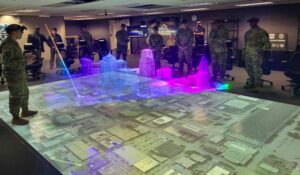THE PENTAGON IS pursuing a high-tech program that will “minimize cognitive burden” on soldiers, according to budget documents released last week. The $40 million-plus classified program, codenamed “CARCOSA,” shares the same name as “the temple” in the first season of the HBO TV series “True Detective,” a place where an elite p e d o p h i l e ring performs ritual abuse on children.
The program is overseen by the Defense Advanced Research Projects Agency, or DARPA, the Pentagon’s premier organization funding the development of futuristic weapons and military capabilities.
There is of course no evidence that the military’s CARCOSA is involved in anything like that; but it’s unclear why, at a time when the White House has prioritized fighting “dangerous conspiracy theories,” DARPA is providing the conspiracy crowd with such fodder. The Intercept reached out to DARPA to inquire whether the elite research agency was aware of the strange coincidence or whether there’s a “True Detective” fan at the agency. DARPA did not respond at the time of publication.

The Pentagon’s CARCOSA is its own temple of information, an AI-driven aggregator that is intended to acquire, sort, and display the blizzard of information that reflects what is going on on a fast-moving future battlefield. “The Carcosa program is developing and demonstrating cyber technologies for use by warfighters during tactical operations,” DARPA’s new fiscal year 2025 budget request says. “Carcosa cyber technology aims to provide warfighters in the field with enhanced situational awareness of their immediate battlespace.”
CARCOSA, DARPA says, will help to “minimize cognitive burden on tactical cyber operators.” In other words, headaches caused by the same information overload we all have to deal with everyday. Individual cyber warriors on high-intensity battlefields such as Ukraine and Israel are inundated with data, from their own communications and IT systems, from a virtual Niagara of intelligence inputs, and from electronic attacks via computers, machines, and drones. On top of it all, the modern battlefield is a venue for “information operations,” which seek to manipulate what the enemy sees and believes.
CARCOSA will support an Army mission area called Cyberspace and Electromagnetic Activities, or CEMA, which provides battlefield commanders “with technical and tactical advice on all aspects of offensive and defensive cyberspace and electronic warfare operations.” The Army says CEMA operators are so inundated with information that they need augmented intelligence technology to help sort the signal from the noise.
CARCOSA stands for Cyber-Augmented Reality and Cyber-Operations Suite for Augmented Intelligence. “Augmented reality” refers to immersive technology that produces computer-generated images overlaying a user’s view of the real world, like Apple’s Vision Pro headset. The program supports development of various technologies, at least according to vague budget documents, all of which seek to defeat a new reality of combat: Individual soldiers and commanders can’t process all of the information that they are bombarded with.
The full CARCOSA name, which has not been previously reported, appears in a November $26 million DARPA contract to Two Six Labs, a part of Two Six Technologies and owned by the Carlyle Group. Two Six Labs says it supplies “situational awareness interfaces for cyber operators to distributed sensor networks, from machine learning models that learn to reverse engineer malware to embedded devices that enable and protect our nation’s warfighters.”
“We want to do everything we can to help the US government and the intelligence community,” says Two Six Technologies CEO Joe Logue. “Starting from over here for information operations and influence up through cyber, command control and operations.” In its three years of operations, the Arlington, Virginia, based company has doubled its national security contracts to some $650 million.
“DARPA’s Cyber-Augmented Operations, also known as CAOs, are a vast spectrum of military programs many of which seek to enhance, if not replace, humans with machines,” says Annie Jacobsen, author of “The Pentagon’s Brain: An Uncensored History of DARPA, America’s Top-Secret Military Research Agency.”
CARCOSA is also mentioned in a DARPA broad agency announcement released February 2023. In the announcement, DARPA’s Information Innovation Office solicits research proposals to create “novel cyber technologies” for warfighters. CARCOSA, it says, will be a 38-month-long program.
At least one other CARCOSA-related contract, this one worth $13 million, has been awarded to Chameleon Consulting Group, which also focuses on information operations, per its website. Raytheon Cyber Solutions, Inc.; Southwest Research Institute; SRI International; and Battelle Memorial Institute have also received CARCOSA contracts.
Though CARCOSA has appeared in the Pentagon’s budget since 2022, when DARPA sought initial funding for the program, this year’s $41.5 million request represents the largest yet for the program.
“For decades now, DARPA has been leading the world in machine learning systems,” Jacobsen told The Intercept. “Today this gets called AI, but ‘machine learning’ is, I think, a more appropriate term of art — machines are not yet intelligent.”
Time, it would seem, is a flat circle, to quote the iconic line from “True Detective,” and which has popularly come to denote something we’re doomed to repeat again and again and again.





